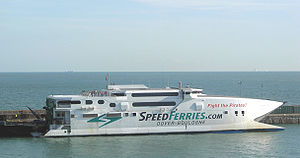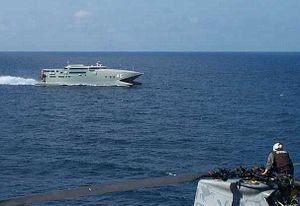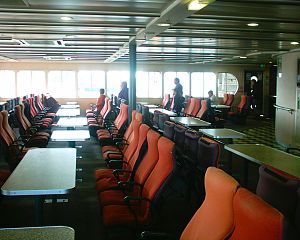HSC Condor Rapide
| |
This article needs additional citations for verification. Please help improve this article by adding reliable references. Unsourced material may be challenged and removed. (November 2008) |
- This article details the service of the Incat 045 catamaran in Europe, from 2002 onwards. For her previous civilian and military service, see HMAS Jervis Bay (AKR 45).
 SpeedOne in Dover, England | |
| Career | |
|---|---|
| Operator: |
1997-1999: Transport Tasmania 1999-2001: Australian Navy 2001-2002: Laid up 2002-2002: TRIS 2002-2004: Laid up 2004-2008: SpeedFerries 2008-2010: Laid up 2010-present: Condor Ferries |
| Port of registry: | Dover, England |
| Route: |
1997-1999: Melbourne - Devonport 2004-2008: Dover - Boulogne |
| Builder: | Incat, Tasmania |
| Yard number: | 045 |
| Launched: | November 1997 |
| Renamed: |
Incat 045 (construction) Winner (TRIS, 2002) HSC SpeedOne (SpeedFerries, 2004-2008) Sea Leopard (2009) Condor Rapide (2010) |
| Identification: | IMO number: 9161560 |
| General characteristics | |
| Displacement: | 1,250 tons |
| Length: | 86.62 metres (284.2 ft) |
| Beam: | 26 metres (85 ft) |
| Draught: | 3.6 metres (12 ft) |
| Propulsion: | 4 x Caterpillar 3618 diesels, 7,200 kW; 4 x KaMeWa 112 S11 waterjets |
| Speed: | 48 knots (89 km/h) |
| Capacity: |
900 passengers (later reduced to 670) 200 cars |
HSC Condor Rapide is a fast ferry operated by Condor Ferries.
Launched in 1997, she was initially chartered out as a civilian ferry, then became the first large catamaran to enter military service when she was commissioned into the Royal Australian Navy as HMAS Jervis Bay (AKR 45) from 1999 to 2001.
In 2002, the catamaran was sent to Europe on charter, operating with Italian company TRIS for during that year, before being chartered by SpeedFerries for their Dover to Boulogne-sur-Mer service. Renamed HSC SpeedOne, she operated on this route until she was impounded by French authorities in late 2008, as the company had failed to pay taxes. SpeedFerries was placed into administration shortly after, and the ferry was laid up until 2010, when she was purchased by Condor Ferries and renamed Condor Rapide.
Contents
Construction and early operating history
Constructed by Incat in their Tasmanian shipyard and named Incat 045, the 86-metre (282 ft) catamaran was launched in November 1997. She was chartered out to TT-Line for a short period as a ferry between Victoria and Tasmania,[when?] then was returned to the shipyard. In May 1999, the catamaran was chartered by the Australian Government for logistics and transport operations. The ship was commissioned into the Royal Australian Navy as HMAS Jervis Bay, becoming the first large catamaran in military service.
The ship was primarily used as a troop and equipment transport between Darwin and Dili in support of the International Force for East Timor (INTERFET) peacekeeping operation. Jervis Bay was decommissioned on 11 May 2001, resuming her original name. In 2002, Incat 045 was chartered to Italian ferry company TRIS and sailed between Genoa and Palau, Italy under the marketing name of Winner until the collapse of the company later that year.
SpeedFerries service
Following the collapse of TRIS, the ferry was laid up in Portland, United Kingdom until 2004. The ferry was chartered by SpeedFerries, renamed to HSC SpeedOne, and registered in Dover, England. The ferry was assigned to operate between Dover and Boulogne-sur-Mer in France.
On 28 December 2007, SpeedOne collided with the Prince of Wales Pier in Dover, ripping a hole in the side of the ferry.[1] No passengers were aboard at the time, and the damage was repaired for the ship to resume operations on 31 December.[1]
On 6 November 2008, SpeedOne was detained in Boulogne-sur-Mer in a dispute over unpaid harbour duties and taxes.[2] SpeedFerries was placed into administration on 13 November, and services were cancelled.[3] The ferry was detained until 20 November, when she left France and sailed to Tilbury, where she was laid up awaiting charter.[citation needed]
On 11 May 2009, HSC SpeedOne was renamed Sea Leopard.[citation needed]
Condor Ferries
On 26 March 2010 it was announced it had been purchased by Condor Ferries and renamed Condor Rapide, it will replace HSC Condor 10 on the Guernsey / Jersey to St. Malo route. [4]
Condor Rapide will transport both vehicles and foot passengers between the Channel Islands and France and due to the higher ramp capacity, larger freight vehicles will be able to use ro-ro services that were previously unavailable on a daily scheduled basis.
References
- ↑ 1.0 1.1 "Sailings resume after ferry shunt". BBC News Online. 31 December 2007. http://news.bbc.co.uk/2/hi/uk_news/england/kent/7165762.stm. Retrieved 14 September 2009.
- ↑ "Ferry seized over 'unpaid taxes'". BBC News Online. 7 November 2008. http://news.bbc.co.uk/1/hi/england/kent/7716225.stm. Retrieved 14 September 2009.
- ↑ "Low-cost ferry in administration". BBC News Online. 13 November 2007. http://news.bbc.co.uk/2/hi/uk_news/england/kent/7728015.stm. Retrieved 14 September 2009.
- ↑ http://www.channelonline.tv/channelonline_jerseynews/displayarticle.asp?id=487880v
External links
- Articles needing additional references from November 2008
- Articles with invalid date parameter in template
- All articles needing additional references
- IMO Number
- Vague or ambiguous time
- All articles with unsourced statements
- Articles with unsourced statements from September 2009
- Ships built in Australia
- Ferries of the United Kingdom
- Ferries of France
- 1997 ships
- Incat high-speed craft


